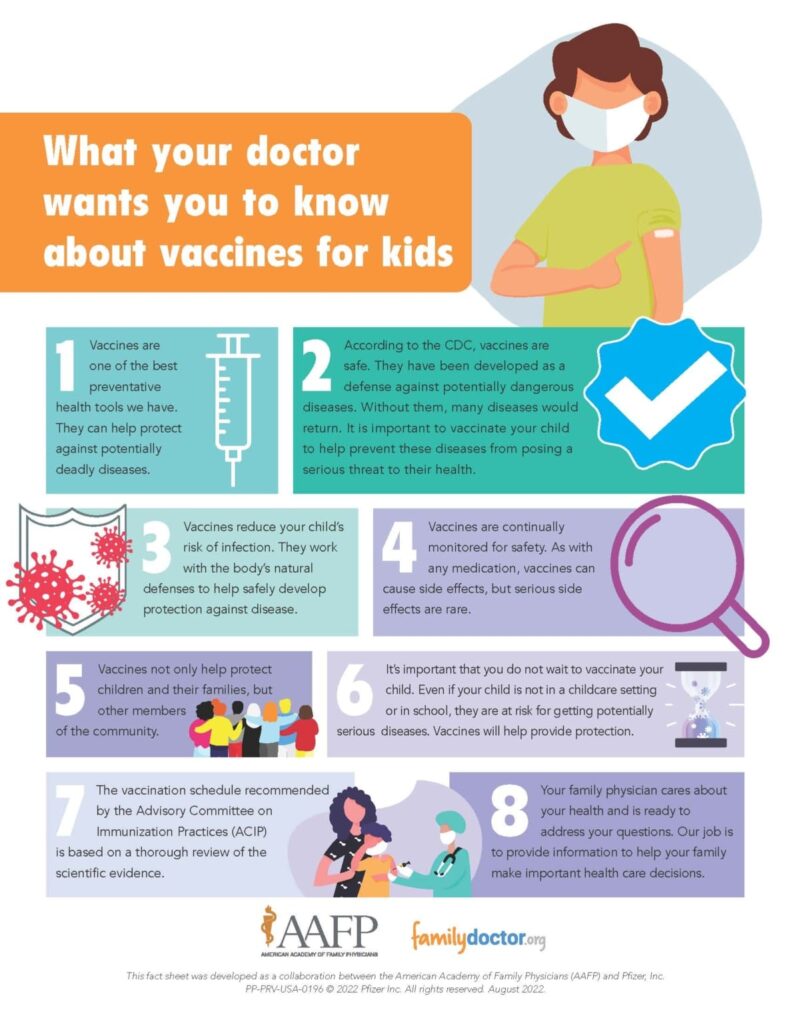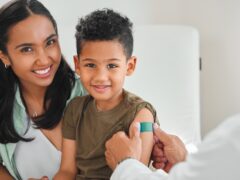A vaccine is a preventive treatment for certain medical diseases. These are diseases that are caused by infections and spread from person-to-person. Vaccines contain a weakened version of the infection or versions that resemble it. Most vaccines are given in childhood. Childhood vaccines help your child’s body build up a protection against the disease if or when they are exposed to it.
Vaccines are important. They not only help keep your child healthy, they help all children by limiting the spread of disease and possibly eliminating serious childhood diseases.
Vaccines are safe and effective and can help prevent against serious illnesses. While there are some vaccines for adults, the majority of vaccines are given to children. That’s because your child’s immune system is still developing. Childhood vaccines help your child’s body build up a protection against diseases.
Why is it important to vaccinate my child?
Vaccinating your child is one of the most effective ways to protect your child from illness. Childhood vaccinations are a safe and proven method for preventive health. They are also cost-effective and almost all vaccines are covered by insurance, Medicare and Medicaid. A few reasons to vaccinate your child include:
- Vaccines prevent illness. Children are particularly vulnerable to disease. Vaccines help provide protection against a wide range of severe and even deadly illnesses.
- Vaccinating your child protects your community. The more people in a community are vaccinated, the less likely a disease is to exist. This is called herd immunity.
- Many childhood vaccinations are mandatory. Schools often have vaccine requirements, and some vaccines are required for travel to certain countries.

Childhood vaccine schedule
Children receive vaccines in line with recommendations called immunization schedules or vaccine schedules. You can trust these immunization schedules because they come from credible experts who are trained on understanding vaccines and providing reliable information to families.
The American Academy of Family Physicians (AAFP) provides an immunization schedule that your family doctor will recommend.
Childhood vaccine misinformation
Parents want the best for their children and want them to be healthy. Unfortunately, there is a lot of vaccine misinformation out there. While making healthcare decisions about your child is a personal choice, it’s important to be aware of common vaccine myths and misinformation.
- Childhood vaccinations do not cause autism. While rates of autism are growing, there are no studies that link vaccinations and autism.
- Childhood vaccinations do not overload the immune system. Vaccines sometimes contain inert or dead viruses, but your child is exposed to significantly more germs every day.
- Childhood vaccines do not cause disease. Sometimes a vaccinated child will get symptoms similar to the disease they’re getting vaccinated for. This is a normal part of the immunization process.
Childhood vaccines help prevent outbreaks
Vaccines are generally safe, and vaccine protection far outweighs the small risk of serious side effects. Thanks to vaccines, many serious childhood diseases are rare today. Without vaccines, diseases can return and impact large numbers of the population. Measles is a serious disease that can lead to complications and death, but there have been recent outbreaks that have affected populations with low vaccination rates. Vaccinating your child is the best thing you can do to guard against these preventable illnesses.
Should my child get vaccinated for COVID-19?
The AAFP recommends that all children aged 6-23 months should be vaccinated. For children between the ages of 2 and 18, your doctor can help you determine if your child should be vaccinated.
Pregnant patients are also recommended to receive the COVID-19 vaccine during any trimester and including during lactation.
Questions to ask your doctor
- How likely is it my child would get sick without getting the vaccines?
- How can I protect my newborn from being exposed to another child who hasn’t been vaccinated?
- What vaccine myths should I be aware of?
- Can my child have an allergic reaction after a vaccine?
- Should my child wear a mask in public to avoid COVID-19 even if they are vaccinated?
ADVERTISEMENT
ADVERTISEMENT





